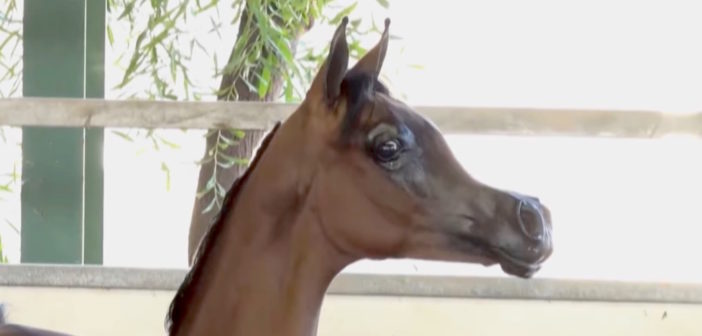UK vets have reacted strongly to images of a horse that has been bred to achieve an extreme concave or ‘dished’ profile, warning of numerous health risks.
View the images here: http://orrionfarms.com/our-horses/el-rey-magnum-rcf
In the Veterinary Record on October 13th, they say this is the first notable example of the sort of extreme breeding that the profession has become familiar with in dogs and cats – and represents “a worrying development.”
Earlier this year, the journal announced that it will no longer accept adverts that use images of fashionable flat-nosed dog breeds like bulldogs, French bulldogs and pugs because of concerns over their health and welfare.
Commenting on the images, Adele Waters, Editor of Veterinary Record said:
“My first thoughts were ‘is this the work of CGI trickery?’ Many specialist horse vets have had a similar reaction. But the truth is this is a real horse and it has been bred to meet the demands of a particular market that likes a particular appearance. Where will it end? Is it really so bad for a horse to look like a horse and not a cartoon character?”
The nine month old colt, called El Rey Magnum, was bred by Orrion Farms, a specialist Arabian breeding farm in Ellensburg, Washington, USA.
Doug Leadley, farm manager and primary breeding adviser for Orrion, said “this horse is a stepping stone to getting close to perfection.” Since launching a promotional video earlier this month, the farm has received interest from across the world, including the UK.
Reaction on social media has been polarized with some declaring the horse beautiful and others horrified.
UK equine expert Tim Greet acknowledged that Arabian horses have always had a rather ‘dished’ face, but said “this takes things to a ridiculous level.” The deformity is even more significant for a horse than for a dog, he explains. “Dogs like man can mouth breathe, but horses can only breathe through their nose. I suspect exercise would definitely be limited for this horse.”
Jonathan Pycock equine reproduction expert and president of the British Equine Veterinary Association (BEVA) said the horse represented a radical variation on what was normal. And he warned that the head shape with a dipped nose “served no functional purpose and could put the horse at risk of breathing problems.”
Dr Madeleine Campbell, an equine reproduction specialist, expert in animal welfare and ethics and director of the Equine Ethics Consultancy, said: “Whilst it is obviously impossible to comment on an individual animal based only on photographic evidence, as a general principle any trend towards breeding for extremes of form which might adversely affect normal function must be condemned, on welfare grounds.”
She added: “This would apply equally to head shape which might compromise the ability to breathe or eat normally or, for example, to extremes of animal size which might compromise the ability to give birth normally.”
US vets recognised El Rey as an example of an extreme breed. However, one vet confirmed the horse had no medical issues or respiratory issues.
Featured image: screenshot from “‘Cartoon-like’ horse is bred for ‘perfection,'” The Telegraph, 10/13/17. Fair use.





